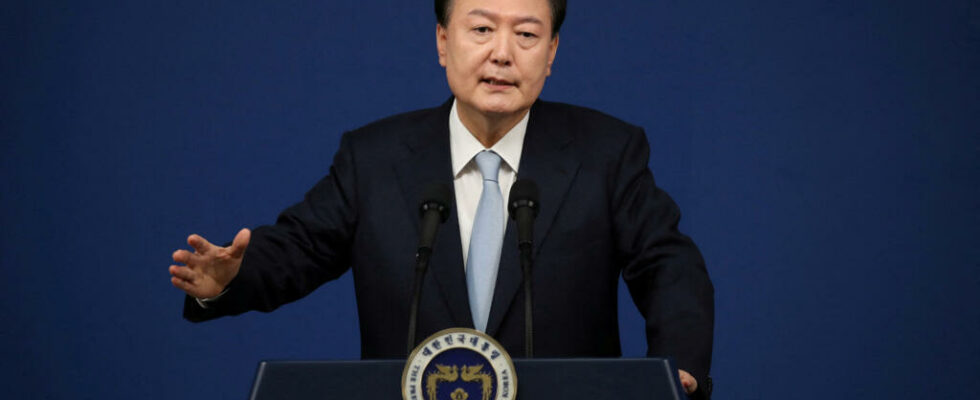Conservative South Korean President Yoon Suk-yeol clings to power. This Thursday, December 5, his party announces that it will defeat a motion for impeachment tabled in Parliament by the opposition after its failed attempt to impose martial law. At the same time, the party leader asked him to leave the political party.
3 mins
Yoon Suk-yeol had sowed astonishment in South Korea Tuesday evening by declaring martial law and ordering the army to invade Parliament, before turning around six hours later under pressure from deputies and demonstrators.
Six opposition parties filed an impeachment motion against the president on Wednesday, accusing him of having “ seriously violated the Constitution and the law “. This motion will be put to a vote on Saturday at 10 a.m. UT (7 p.m. local), according to the Yonhap news agency. The opposition has a total of 192 seats out of 300 in the National Assembly, with the other 108 deputies belonging to Yoon Suk-yeol’s People Power Party (PPP).
The motion must be adopted by a two-thirds majority, so the defection of at least eight deputies from the presidential party will be necessary to bring about the fall of Yoon Suk-yeol.
On Thursday, the leader of the PPP in Parliament, Choo Kyung-ho, affirmed that his party would vote against. “ All 108 deputies of the People’s Power Party will remain united to reject the impeachment of the president “, he told the press. Choo Khyung-ho, however, added that he had asked Yoon Suk-yeol to leave the party. The PPP “ is not trying to defend the president’s unconstitutional martial law “, he assured.
Necessary confirmation from the Constitutional Court in the event of impeachment
If the motion passes, Yoon will be suspended from office pending confirmation of his dismissal by the Constitutional Court. If the judges give the green light, he will leave power and a new presidential election will have to be organized within 60 days. The Democratic Party, the main opposition force, at the same time announced the filing of a complaint against the president for “ rebellion », a crime theoretically punishable by the death penalty (which has no longer been applied in South Korea since 1997).
Yoon Suk-yeol has not appeared in public since his last speech on national television, at dawn on Wednesday, to announce the lifting of martial law which he had declared the previous evening.
His office announced the resignation of Defense Minister Kim Yong-hyun on Thursday. But others close to the president, including Interior Minister Lee Sang-min, remain in their posts.
Martial law was last activated in 1980 in South Korea, when hundreds of thousands of people took to the streets to protest a military coup. The repression then left hundreds of dead.
Yoon Suk-yeol’s action took South Korea’s allies by surprise, first and foremost the United States, which has nearly 30,000 troops in the country. Washington said it learned of the martial law announcement from television.
Also readSouth Korea: President Yoon Suk-yeol’s back to the wall after his attempt to impose martial law
